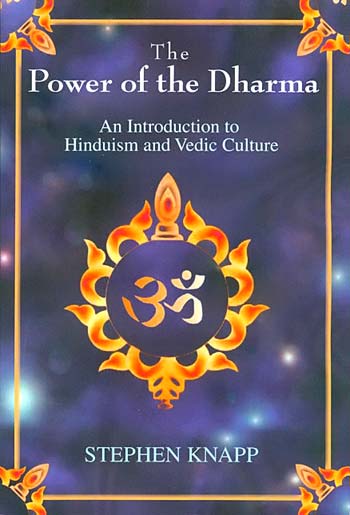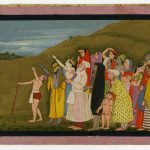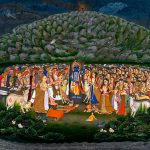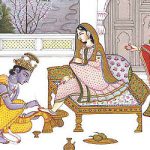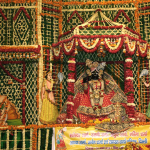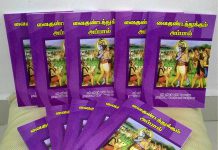An Introduction to Hinduism and Vedic Culture
This has been especially written for those who want an easy reference and introduction to the Vedic Hindu philosophy and tradition. This provides a concise overview and quick guide of the major principles found within Vedic culture, and answers the most common questions people have about Vedic customs and its Dharmic teachings. It also offers a good grasp of the essential values and ideology of the Vedic path while keeping it simple to understand. It provides many insights into the depth and value of the timeless wisdom of Vedic spirituality and reveals why the Dharmic path has survived for thousands of years.
This reveals why the Dharma is presently enjoying a renaissance among an increasing number of people who want to explore its teachings and see what its many techniques of self-discovery have to offer.
In "The Power of the Dharma", you will find:
• quotes by noteworthy people on the unique qualities of Hinduism;
• essential principles of the Vedic spiritual path;
• particular traits, customs, and explanations of Hindu worship;
• descriptions of the main yoga systems;
• significance and legends of the colorful Hindu festivals;
• benefits of Ayurveda, Vastu, Vedic astrology, and gemology;
• important insights of Dharmic life and how to begin practicing it.
This book also serves as an introduction to deeper reading that a person may like to do in considering the more elaborate explanations of the Vedic/Hindu philosophy. And as an introduction or a companion to other books by Stephen Knapp, such as The Secret Teachings of the Vedas: The Eastern Answers to the Mysteries of Life, which is a good in-depth analysis and exposition of the Vedic spirituality and philosophy, and The Heart of Hinduism: The Eastern Path to Freedom, Empowerment and Illumination, which is a complete course in itself for learning exactly what Hinduism and Vedic culture teaches. So if this book piques your interest and you are inquisitive to learn more about the deeper aspects of Vedic spirituality, those are the books that can take you much farther in this spiritual knowledge and awareness. (Details of both can be found on www.stephen-knapp.com)
The Dharmic path can provide you the means for attaining your own spiritual realizations and experiences. In this way, it is as relevant today as it was thousands of years ago.
This is the power of Dharma's universal teachings which have something to offer everyone!
Price: $15.95, Paperback, Size: 6" x 9", Pages: 170, ISBN: 0-595-39352-7.
Ordering Information
You can order the paperback version straight from www.iUniverse.com. European orders will be shipped out of England.
The Adobe Ebook version ($6.00) can be ordered and downloaded through www.iUniverse.com.
Orders from bookstores or catalogs can also be placed through iUniverse at discounted prices by calling 1-402-323-7800 extension 501, or by emailing: book.orders@iuniverse.com. International orders: Call 00-1-402-323-7800.
These are also available through Baker & Taylor Book Distributors and Ingram Distributors.
To order it from BarnesandNoble.com, use this link.
To get it from Amazon.com, use this link.
{mospagebreak title=Page 2: Book Contents}
Book Contents
Introduction
Chapter 1: What is Vedic Culture/Hinduism?
The Simple Definition of Hinduism * What Hinduism is Not * The Versatility of Hinduism * Who Founded Vedic Culture * Vedic Culture Started Before the Beginning of Time
Chapter Two: Quotes by Noteworthy People on the Glories of Vedic Culture
Chapter Three: The Essential Principles of the Vedic Path
Chapter Four: Explanations of the Essential Vedic Principles
Principle One–The Vedic Tradition is a Way of Life * Principle Two–The Universal Truths are for Everyone * Principle Three–Hinduism's Correct Name is Sanatana-Dharma * Principle Four–The Vedic Understanding of God * Principle Five–All Existence is part of the One Great Truth * Principle Six–The Avataras of God * Principle Seven–The Supreme is Found in the Spiritual Dimension and as the Supersoul * Principle Eight–We are All Eternal * Principle Nine–The Soul Undergoes Reincarnation * Principle Ten–The Goal of the Vedic Process * Principle Eleven–We Are Spiritual Beings in the Realm of Matter * Principle Twelve–We Are One Universal Family * Principle Thirteen–Spiritual Progress Does Not Depend on One's Birth * Principle Fourteen–Respect for Individual Freedom of Inquiry * Principle Fifteen–The Wonder and Beauty of the Vedic Path * Principle Sixteen–All Life is Precious * Principle Seventeen–The Law of Karma * Principle Eighteen–The Material Manifestation is Designed and Created * Principle Nineteen–Hindus Worship Many Gods? * Principles Twenty and Twenty-one–The Divinity of the Vedic Texts and Sanskrit * Principles Twenty-two and Twenty-three–What are the Vedic Texts * Principles Twenty-four and Twenty-five
Chapter Five: Sanatana-Dharma: Its Real Meaning
Chapter Six: The Power of the Dharma
Chapter Seven: The Vedic Spiritual Paths to Liberation
Jnana-yoga * Karma-yoga * Raja-yoga * Bhakti-yoga * The Significance of OM * The Potency of the Hare Krishna Mantra
Chapter Eight: Particular Traits of Vedic/Hindu Worship
Why Hindus Worship Images * Hindus Do Not Worship Idols * Basic Techniques in Vedic Worship of God * Why Devotees Have Prayer Rooms in Their House * What is "Namaste" * Why Red Dots are Worn on the Forehead * What is Tilok or Forehead Marks * What is the Holy Ash * Why Shanti is Said Three Times * Why Ring Bells in the Temples * The Reason Lamps are Used * The Significance of the Aarati Ceremony * Why a Conch Shell is Blown * Why Coconuts are Offered * Purpose of Offering Food to the Lord Before Eating * Why a Kalasha (Pot) is Worshiped * Why Worship the Tulasi Tree * Why the Lotus is Sacred * Purpose of Fasting * Purpose of Temples * The Significance of the Vedic Temple * Purpose of Circumambulating Temples or Deities * Why Non-Hindus are not Always Allowed to Enter Temples in India * Purpose of Pilgrimages * Why Hindus Respect the Cow
Chapter Nine: The Dharmic Festivals
Makara Sankranti * Vasant Panchami * Maha Shivaratri * Holi * Gaura Purnima * Shri Rama Navami * Ugadi and Vishu * Hanuman Jayanthi * Guru Purnima * Onam * Raksha Bandan * Krishna Janmashtami * Ganesh Chaturthi * Navaratri * Dusshera * Karva Chauth * Deepavali * Gita Jayanthi
Chapter Ten: Other Important Traits of Vedic Dharma
The Vedic Path Has a Most Developed and Complete Spiritual Philosophy * The Purpose of Having a Guru * Nonviolence * Compassion is a Prime Principle of Vedic Dharma * Vegetarianism * Vedic Dharma Promotes Seeing God in all Living Beings * Vedic Scriptures do not Condone Abortion * The Vedic Path Views all Religions as Portions of the One Truth and Ways of Understanding God * Truth is One, the Names are Many, But all Religions are not the Same * Sanatana-Dharma has Spiritual Knowledge Found Nowhere Else * Hindus are not Interested in Converting Others * Vedic Dharma has no Concept of Jihad, Holy Wars, Crusades, or Martyrdom on its Behalf * This is why the Followers of the Vedic Path can Live Peacefully with those of Other Religions * Hindus or Dharmists Prefer to Share the Vedic Knowledge Freely * If Hinduism Dies Out * Vedic Dharma is not Poverty Based * Vedic Dharma Teaches that the World is Real but Temporary * The Dharma Teaches that Desires Merely Need to be Spiritualized * Hindus Practice Monogamy * Hindu Dharma Does not Teach that there is a Competing Evil Force * Vedic Dharma Teaches that we Should Achieve God's Grace * The Position of Women in a Truly Vedic Society * In Essence, Vedic Dharma Opens the Door to the Real Potentials of Life
Chapter Eleven: Who May Be a Hindu or Practice Sanatana-Dharma
Sharing the Dharma * Becoming a Dharmist or Devotee is Easy * The Basics of a Daily Routine
Conclusion: The Future
Glossary
Index


